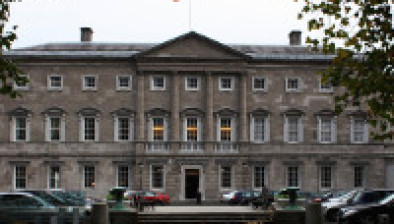High Court: TDs granted leave to proceed with ‘money message’ case
Solidarity-People Before Profit TDs have been granted leave to apply for judicial review of a decision of the Ceann Comhairle, which will be dealt with in an expedited hearing before the end of the year.

About this case:
- Citation:[2019] IEHC 746
- Judgment:
- Court:High Court
- Judge:Mr Justice Garrett Simons
Noting the need to approach cases involving Parliament with a degree of caution, Mr Justice Garrett Simons said the TDs had an arguable case regarding the Ceann Comhairle’s decision to block a motion brought by the TDs to end the overuse of money messages.
Money messages
The within proceedings concern the “ongoing controversy” around the use of money messages in the current Dáil.
Mr Justice Simons explained that, as the Government does not command a majority, it cannot effectively control the business of the House. On a number of occasions, members of the opposition have put forward Private Members’ Bills – however, these Bills have “been put into a form of limbo as a result of the use of Article 17 of the Constitution”. Article 17 effectively “reserves onto the Executive the power to initiate and proceed with legislation which would involve a charge on the funds of the Oireachtas”.
Article 17.2 of the Constitution states:
“Dáil Éireann shall not pass any vote or resolution, and no law shall be enacted, for the appropriation of revenue or other public moneys unless the purpose of the appropriation shall have been recommended to Dáil Éireann by a message from the Government signed by the Taoiseach.”
Such messages are colloquially known as “money messages”. The Applicants are four Solidarity-People Before Profit TDs (Bríd Smith, Richard Boyd Barrett, Gino Kelly, and Paul Murphy) who allege that the money message procedure is being overused.
In attempting to bring an end to this “inappropriate practice”, the Applicants sought to amend Standing Order 179 which “in effect gives life to Article 17 of the Constitution by ensuring that certain Bills only progress if a money message is received”.
Low threshold for leave met
The Ceann Comhairle (in purported exercise of his power under Standing Order 27) refused to allow this motion to go forward, resulting in the within application for leave to apply for Judicial Review.
Granting leave, Mr Justice Simons said there was an arguable case in relation to Article 17.2 of the Constitution and that it was arguable that the Ceann Comhairle’s decision may be justiciable.
Having considered the material before him on affidavit (particularly a document entitled “Opinion on the Constitutional Limits of the ‘Money Message’ Procedure under Article 17.2 of the Constitution of Ireland” (by Dr David Kenny at TCD and Dr Eoin Daly at NUIG), Mr Justice Simons was satisfied that there was “at least an arguable case that the current understanding by the Government of the money message procedure may be overly generous or overly broad”.
Mr Justice Simons said the question of whether the Ceann Comhairle’s decision was challengeable was more difficult because of the separation of powers.
Noting the need for Courts to exercise caution in “trespassing upon the functions of Parliament”, Mr Justice Simons said the case made the low threshold for leave.
Interlocutory relief refused
The Applicants also applied for interlocutory relief; however, this issue had become moot as the time originally allocated for discussion of the motion to amend Standing Order 179 on 6 November 2019 had already passed by the time Mr Justice Simons made his ruling.
In any event, Mr Justice Simons said he would not have granted interlocutory relief as he was not satisfied that the threshold had been met in this regard. Considering the test set out by the Supreme Court in Okunade v Minister for Justice [2012] IESC 49, Mr Justice Simons opined that “a slightly higher threshold must be met” where “the relief involves a prima facie or a potential trespass on the powers of another organ of State”.
Reiterating concerns regarding the separation of powers, Mr Justice Simons said that if he had granted an interlocutory injunction it would have had the effect of rewriting the order paper voted upon and passed by a majority of the Dáil the previous day. Although the order paper omitted the motion they wished to debate, Mr Justice Simons said that he could not overlook the fact that Parliament had voted in favour of the form of the order paper.
Adding that “it would take an exceptional argument to persuade this court that it has jurisdiction at an interlocutory stage to interfere with that and to direct Parliament to debate a matter which Parliament itself has voted it will not debate”, Mr Justice Simons said that interlocutory relief was not appropriate and the matter should instead be dealt with in an expedited hearing.









